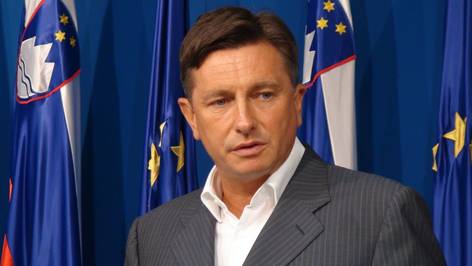NEWS
Prime Minister Borut Pahor: 'Leave behind the best possible legacy for those assuming responsibility for our country's future'
Slovenia's Prime Minister, Borut Pahor, today attended the meeting of the Economic and Social Council, during which the members exchanged their views on further social dialogue and major reforms. At the press conference that followed the meeting, Prime Minister Pahor said that the Government's efforts continued to be focused on the preparation of health and labour market reforms and that he saw no possibility of reaching a compromise on changes to pension legislation. The participants at today's meeting also agreed to continue this dialogue. They will meet again, either at the end of this month or at the beginning of the next, to discuss an eventual supplementary budget proposal, the state's capital investment strategy, and the results of the EU summit, which is scheduled to take place next weekend.
Prime Minister Pahor added that, in light of the conclusions of today's meeting, there would be no discussion on specific reforms as long as political uncertainty persists. It was also agreed to wait for the period of political uncertainty to pass, whatever its outcome. 'As long as I head the Government and hold full political power, the Government will continue with its preparations for health and labour market reforms, in agreement with its social partners, in order to pave the way for a substantive discussion in early September,' asserted Prime Minister Pahor.
On the subject of the state's capital investment strategy, Mr Pahor said that he proposed that the social partners consult on this when they meet at the beginning of July. The Government would like to hear the opinion of its social partners before finally adopting a draft strategy. The issue of privatisation has become a 'political issue', not only in Slovenia but also elsewhere in Europe,' added Prime Minister Pahor. In this respect he cited Greece as an example where the trade unions strongly opposed the sale of state assets required by the International Monetary Fund within the framework of reforms.
With regard to Gregor Golobič's resignation as the Minister for Higher Education, Science and Technology, Mr Pahor said that in all likelihood he would not attempt to find his successor, but would rather appoint an existing minister to take up this duty. 'The last thing I should be looking to do now is dealing with cabinet changes, particularly if they are not introduced in consultation with our coalition partners,' explained the Prime Minister. In his view, it is of no use for the state to deal with cabinet changes 'if my coalition partners are not willing to provide assistance, even in the sectors from which they are leaving,' added Prime Minister Pahor. Mr Pahor would like to discuss with his coalition partners 'the possibilities for maintaining control over our own destiny and ending the period of high uncertainty by minimising or suppressing social and economic losses and by maintaining or even strengthening our fiscal policy'. Prime Minister Pahor concluded by saying that the next government, even if it enjoyed a higher degree of popularity than his own, would also be obliged to deal with unpopular changes and the threat of referenda, which would be a serious problem. For this reason, Prime Minister Pahor believes that, 'what it is needed now is to carry on with our activities as best we can in order to leave behind the best possible legacy for those assuming responsibility for our country's future.'




